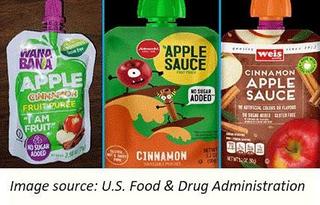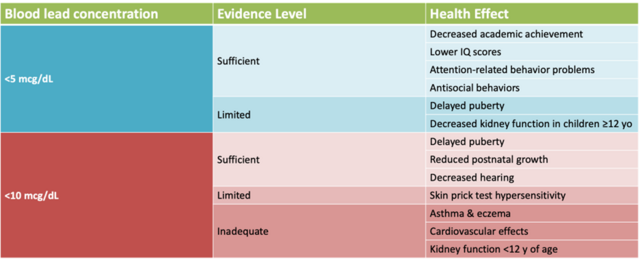Cinnamon Applesauce Pouches: Elevated Lead and Chromium Exposure
 The Food and Drug Administration (FDA) and Centers for Disease Control and Prevention (CDC) recently warned people not to eat certain brands of cinnamon applesauce pouches because they had elevated levels of lead in them.
The Food and Drug Administration (FDA) and Centers for Disease Control and Prevention (CDC) recently warned people not to eat certain brands of cinnamon applesauce pouches because they had elevated levels of lead in them.
At least 69 children between 1 and 5 years old have had high blood lead levels linked to the recalled applesauce and apple puree pouches. These cases were reported in more than two dozen states. View a list of the recalled pouches here.
The FDA traced the source of lead to cinnamon used in the products. A cinnamon applesauce product sample that was tested by the FDA had over 2,000 times more lead than the FDA proposed standards for fruit purees intended for consumption by babies or young children.
The lead-contaminated ground and powdered cinnamon was provided by a distributor in Ecuador to another company in Ecuador that used the cinnamon in the applesauce pouches. The FDA is screening shipments of cinnamon from outside the U.S. for lead.
Read more on the FDA efforts.
How does lead get into applesauce?
Metals like lead, arsenic and mercury are found on the earth and get on plants through pollution in the air or water. Sometimes, vitamins added to foods may be contaminated by lead. Lead may also be found in tanks used in international spice processing. Unfortunately, in other countries, lead pigments may be added to spices to improve their color, or lead may be added to spices to increase their weight. That’s why there is a need for careful testing by importing food companies.
Families
What should I do if my child ate the recalled applesauce?
The most important step is to stop your child from getting any more exposure to lead. If you have the recalled applesauce, open each pouch and empty the contents into a trash can and throw away the empty packages.
If your child has eaten a recalled fruit pouch, talk to your child’s pediatrician or health care provider about getting a blood test for lead. Anyone with symptoms or exposure to this product can report the complaint or adverse event to the FDA, your regional poison control center (1-800-222-1222) or Pediatric Environmental Health Specialty Unit.
How are high blood lead levels diagnosed and treated?
The only way to find lead in children is with a blood test. Most children with high lead levels won't look sick, but even small amounts can be harmful to the brain and make it harder for kids to learn or to control their behavior.
Larger amounts of lead can lead to headache, irritability, constipation, crampy stomachaches or other problems. Severe lead poisoning can cause seizures or coma. When lead poisoning is severe, doctors may recommend medicine to lower a child’s blood lead levels.
Remember
The most important treatment for your child is to prevent further exposure to lead. Parents can help their children by feeding them a healthy diet with plenty of calcium and iron and helping them to get good rest and also to exercise their brains through reading and puzzles.
More Information
- Blood Lead Levels in Children: What Parents Need to Know
- Lead Exposure: Take Steps to Protect Your Family
- Heavy Metals in Baby Food
- Childhood Lead Poisoning Prevention (CDC)
Health Providers and Clinicians
Lead is toxic to humans and can affect people of any age or health status. Protecting children from exposure to lead is particularly important because lead can affect neurodevelopment by increasing the risk for learning or behavioral problems. Most children with lead poisoning have non-specific symptoms. Red flags regarding lead exposure include headache, abdominal pain/colic, vomiting, irritability, lethargy, fatigue, constipation and/or tremor.
The severity of symptoms is not related to length of exposure but the absolute lead level. Studies demonstrate that long-term, “low dose” exposure is more likely going to impact neurodevelopment. See table below.

Adapted from AAP COUNCIL ON ENVIRONMENTAL HEALTH. Prevention of Childhood Lead Toxicity. Pediatrics. 2016;138(1):e20161493
The Centers for Disease Control and Prevention recommends clinicians:
- Counsel patients, families, schools, and early care centers not to eat or serve the recalled cinnamon-containing apple purée or applesauce products.
- Educate patients and families about the health effects of lead exposure in children and the importance of seeking medical care.
- Test children who have consumed a recalled applesauce pouch for lead exposure. Refer to CDC guidance on testing children for lead exposure and AAP clinical guidance for managing lead exposure in children. Recommendations for obtaining BLLs may be available from your local health department or regional Pediatric Environmental Health Specialty Unit.
- Consider lead exposure in the differential diagnosis of patients presenting with clinical findings associated with lead poisoning.
Additional resources:
Prevention of Childhood Lead Toxicity
CDC (updated Jan 5, 2024): Update on High Blood Lead Levels in Children Consuming Recalled Cinnamon Applesauce Pouches and Potential Chromium Exposure
FDA Investigation of Elevated Lead Levels: Cinnamon Applesauce Pouches November 2023






